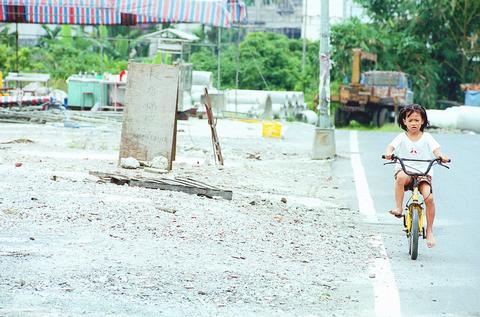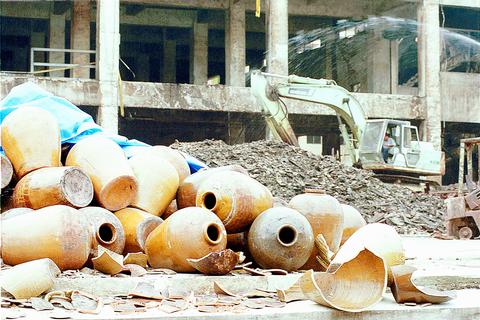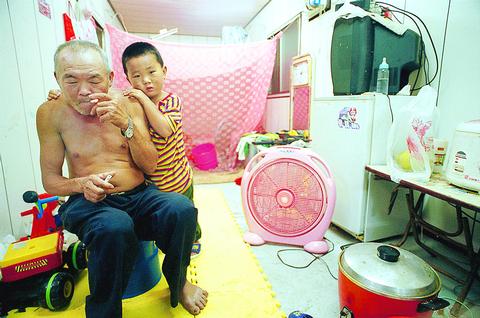One year after the 921 earthquake, tackling quake-related crimes remains a major task for Taiwan's legal system.
A recent indictment came on Tuesday, when 10 builders and architects involved in the construction of a multi-story residential complex that collapsed and killed 28 people in Tungshih (東勢), Taichung County, were charged with manslaughter and forgery. Tungshih was one of the areas worst-hit by the earthquake.
This is at least the 32nd indictment in this type of case, and the number of people indicted has risen to around 160, according to data from the Ministry of Justice and district prosecutors' offices. Few cases have reached a court ruling, however.

PHOTO: CHEN CHENG-CHANG, TAIPEI TIMES
Faulty building construction that resulted in deaths and damage is just one kind of quake-related crime being targeted by the judiciary. Others include embezzlement of post-quake relief or reconstruction funds and goods, and bid rigging in public reconstruction projects.
The progress of building collapse cases has been widely criticized as being too slow, and victims are still waiting to receive compensation from construction firms. A lawyer who volunteered to assist victims in Taipei City's Tunghsing Building (東星大樓) case, in which 89 died, attributed much of the delay to the complicated process of authenticating the causes of each collapse.
Shoddy building

PHOTO: CHEN CHENG-CHANG, TAIPEI TIMES
In the Tunghsing case, the prosecutor had commissioned the Taipei City Professional Civil Engineers Association (台北市土木技師公會) to carry out an authentication and accordingly five contractors and architects were indicted last November. "But further authentication demanded by the accused is still going on," said lawyer Justin Hsieh (謝政達).
Hsieh said that a major difficulty for Tunghsing's authentication is that the apartment complex was built 17 years ago -- when construction codes and decrees were not yet well developed.
"The lack of definite regulations might leave room for the construction firms to argue that they did not violate the law," Hsieh said.

PHOTO: CHEN CHENG-CHANG, TAIPEI TIMES:
Related information is also hard to gather in such cases.
He said in two other cases where the destroyed buildings were only five or six years old, such as the Doctors' Home (博士的家) complex in Hsinchuang (新莊), Taipei County, the legal process has gone more quickly and smoothly than that of Tunghsing.
Another major problem with the Tunghsing case, Hsieh said, is that of the five people indicted, one, a construction firm boss Hsieh Lung-sheng (謝隆盛), has became a vegetable after suffering a stroke some time prior to the quake, and two others are abroad, not willing to attend court hearings.
The Taipei District Court ordered the provisional seizure of the construction firms' real estate, valued at some NT$300 million, but no convictions or final settlement has been made for the Tunghsing case.
"A conviction will bring justice, but now the most important thing for the victims may be for them to reach a settlement and get compensation," Hsieh said.
He could not predict, however, when a settlement might be reached.
While a number of large apartment complexes collapsed in the 921 quake, the Doctors' Home case is one of only a few cases in which judgements have been reached and convictions made. A settlement is reportedly expected in a few days. But the court ruling has still prompted debate.
The Doctors' Home case is an example of "license leasing" -- a practice with a long history and prevalent in Taiwan's construction industry.
In license leasing, the construction company which undertakes to build a building does not really conduct the work itself. Instead, it leases its license to companies that are not necessarily qualified to do the work required for the project. It is these companies and subcontractors that actually carry out the construction work and for this reason, construction is often substandard.
In the Doctors' Home case, Panchiao (板橋) District Prosecutor Chen Ming-hsiang (陳銘祥) indicted for manslaughter not only the real builders of the collapsed block, but also officials of the company which had leased out its license.
Chen said at the time that the company possessing the license should also be held responsible for the shoddy construction and thus the deaths of the victims.
But the Taipei district court later ruled on June 12 that officials of the company were guilty of forgery but not guilty of manslaughter. The court convicted five builders and subcontractors of manslaughter.
The court said there was no evidence indicating obvious causation between license-leasing and poor quality of a building -- a conclusion with which lawyer Jhering Cheng (鄭文龍) does not agree.
"Of course there is a causal link between these two things. The companies leasing out licenses are able to assess that the companies without licenses are not capable of building houses of good quality. If they do not lease out licenses, these flawed buildings would not be built," Cheng said.
Public safety will not be secured if people who lease out licenses are not held responsible [for the casualties]," Cheng said.
He also said that the Taipei Bar Association (台北律師公會) is to hold a conference at the end of this month to discuss related issues.
Corruption
To the many who were deeply impressed and moved by the solidarity Taiwan society showed after the quake, the idea that government officials would take advantage of the unprecedented tragedy to embezzle relief and reconstruction funds intended for quake victims has come as a shock.
But this has happened.
Wu Chao-feng (
Chen Kuo-hsiung (
Lin Wen-sheng (
Chen Tsang-nan (
These cases are the most high profile ones and similar cases are not rare. Divisional head prosecutor at Nantou District Prosecutors' Office, Hsu Sung-kuei (
"This is a chronic disease of society. Perhaps because in the past too few [offenders of corruption] have been caught, now, that which is wrong has been practiced for so long that it has come to be regarded as right and commonplace by many public officials," Hsu said.
However, Hsu said, a major problem that has encouraged people like Wu Chao-feng to embezzle is the government's inefficiency in dealing with the relief.
"One year on, so much of the relief funds have not reached quake victims. This is evidence that the government's administrative operation is still in chaos.
"A lack of good management of relief funds and goods leaves opportunities for misappropriation to those who have access to these resources," Hsu said.
Gangsters
After the destruction wreaked by the quake there were numerous reconstruction projects. These have not escaped the grip of gangsters and corrupt officials.
"The invasion of gangsters into post-quake public reconstruction in disaster areas is severe," said Chu Nan (朱楠), prosecutor-general of Taichung District Prosecutors' Office.
In one instance of bid-rigging, gangsters manipulated businessmen who were bidding on a series of mountain road reconstruction projects in Taichung County, raising the price of the projects in an attempt to get profits out of the government. Fortunately, the criminal attempt failed and 17 people have been convicted.
In reconstruction of the collapsed Shihgang Dam (石岡水壩), 20 people and nine companies were indicted for bid rigging.
A Nantou County councilor, Pan Yi-chuan (潘一全), earlier this month was arrested and charged with using threats of violence to gain public contracts.
Many reconstruction jobs were categorized as emergency projects and in such cases, public bidding was not required. This enabled gangsters to manipulate the tendering process, Chu said.
Chu and Hsu agreed that post-quake corruption and reconstruction contract rigging cases have been a heavy burden on law enforcement agencies in disaster areas and that, more importantly, this has been due to the incompetence of the administrative system.
"For example, public construction or procurement projects undergo several stages of administrative procedures. If there is any problem it should be detected while in the administrative system, before the prosecution launches a criminal investigation," Hsu said.
Five district prosecutors' offices in disaster areas have, on the justice ministry's decree, set up a cooperative mechanism between prosecution and government ethics departments within several governmental agencies to facilitate the detection of crimes.
"However, the monitoring within the administrative system must function first," Chu said, "Otherwise offenders will not be deterred."

CHAOS: Iranians took to the streets playing celebratory music after reports of Khamenei’s death on Saturday, while mourners also gathered in Tehran yesterday Iranian Supreme Leader Ayatollah Ali Khamenei was killed in a major attack on Iran launched by Israel and the US, throwing the future of the Islamic republic into doubt and raising the risk of regional instability. Iranian state television and the state-run IRNA news agency announced the 86-year-old’s death early yesterday. US President Donald Trump said it gave Iranians their “greatest chance” to “take back” their country. The announcements came after a joint US and Israeli aerial bombardment that targeted Iranian military and governmental sites. Trump said the “heavy and pinpoint bombing” would continue through the week or as long

TRUST: The KMT said it respected the US’ timing and considerations, and hoped it would continue to honor its commitments to helping Taiwan bolster its defenses and deterrence US President Donald Trump is delaying a multibillion-dollar arms sale to Taiwan to ensure his visit to Beijing is successful, a New York Times report said. The weapons sales package has stalled in the US Department of State, the report said, citing US officials it did not identify. The White House has told agencies not to push forward ahead of Trump’s meeting with Chinese President Xi Jinping (習近平), it said. The two last month held a phone call to discuss trade and geopolitical flashpoints ahead of the summit. Xi raised the Taiwan issue and urged the US to handle arms sales to

BIG SPENDERS: Foreign investors bought the most Taiwan equities since 2005, signaling confidence that an AI boom would continue to benefit chipmakers Taiwan Semiconductor Manufacturing Co’s (TSMC, 台積電) market capitalization swelled to US$2 trillion for the first time following a 4.25 percent rally in its American depositary receipts (ADR) overnight, putting the world’s biggest contract chipmaker sixth on the list of the world’s biggest companies by market capitalization, just behind Amazon.com Inc. The site CompaniesMarketcap.com ranked TSMC ahead of Saudi Aramco and Meta Platforms Inc. The Taiwanese company’s ADRs on Tuesday surged to US$385.75 on the New York Stock Exchange, as strong demand for artificial intelligence (AI) applications led to chip supply constraints and boost revenue growth to record-breaking levels. Each TSMC ADR represents

Pro-democracy media tycoon Jimmy Lai’s (黎智英) fraud conviction and prison sentence were yesterday overturned by a Hong Kong court, in a surprise legal decision that comes soon after Lai was jailed for 20 years on a separate national security charge. Judges Jeremy Poon (潘兆初), Anthea Pang (彭寶琴) and Derek Pang (彭偉昌) said in the judgement that they allowed the appeal from Lai, and another defendant in the case, to proceed, as a lower court judge had “erred.” “The Court of Appeal gave them leave to appeal against their conviction, allowed their appeals, quashed the convictions and set aside the sentences,” the judges